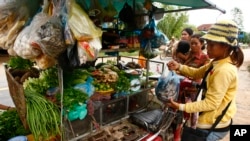Budding environmentalists gathered in Phnom Penh earlier this month to discuss ways to mitigate the growing threat posed by the over-consumption of plastic bags in Cambodia.
At a workshop organized by local groups Plastic Free July (PFJ) and Young Eco Ambassador (YEA) -- simple and fun ways to cut down on plastic waste were debated.
Soth Sonen, one of the PFJ organizers, said the lack of alternatives to plastic in the Kingdom was a worry for the nation’s future.
“Commitment comes first, effective solutions we will approach later, even though it is hard to do, but we together still can do it,” she said.
Prach Soeung Chealy, a YEA member, said he was concerned that the effects of the over-use of plastics would stretch far beyond Cambodia’s borders.
“It does not only affect Cambodia, but also the whole world. Cambodia is a small country, and has not so many people, but the rate of plastic consumption is 10 times more than in Europe and China.”
“Personal behaviors can change the way people act. For instance, throwing plastic away in the trash is way better than dropping it down on the ground or in water,” he said.
Mean Phirom, a sign language translator, said his workplace had started recycling several months ago, adding that the workshop had given good ideas about how to use plastics efficiently and reminds us to behave better for humanity.”
Oum Raksmeythida, another participant, said she thought most people did not realize the consequences of using so much plastic.
“We use plastic more than we should for daily activities without realizing the consequences, so maybe we should start to change, from little things such as not buying plastic bottles of water and instead taking away water from home.”
University student Sao Sokunthi, said the young generations would need to work hard to change old attitudes.
“I have learned so many easy ways to decrease the use of plastic by just starting from ourselves first. At the same time, I think that we should educate people more and more about this topic, particularly the children.”







